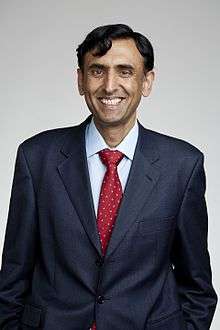Jas Pal Badyal
| Jas Pal Badyal | |
|---|---|
 Jas Pal Badyal at the Royal Society admissions day in London in 2016 | |
| Born |
Jas Pal Singh Badyal March 1964 (age 54)[1] Staffordshire, England, UK |
| Alma mater | University of Cambridge (BA, MA, PhD) |
| Awards |
|
| Scientific career | |
| Fields | |
| Institutions | |
| Thesis | Structure, chemistry and catalysis at the ruthenium-titania interface (1988) |
| Doctoral advisor | Professor Richard Lambert |
| Website | |
Jas Pal Singh Badyal (born 1964) FRS[2] is a Professor in the Department of Chemistry at Durham University.[3]
Education
Badyal was educated at the University of Cambridge[4] where he was awarded a Bachelor of Arts degree in Natural Sciences in 1985 followed by a PhD in 1988 on the surface science of ruthenium-titania heterogeneous catalysts.[5]
Career and research
Following his PhD, Badyal held a King’s College, Cambridge research fellowship and the Cambridge University Oppenheimer Research Fellowship. He was appointed a Lecturer at Durham University in 1989 and was promoted to Full Professor in 1996[2] where he has worked since.
Badyal is internationally recognised for his pioneering research on the functionalisation of solid surfaces and deposition of functional nanolayers. Badyal has invented a wide range of novel surfaces for technological and societal applications. These have been underpinned by the investigation of fundamental mechanisms and scale-up. Examples include: antibacterial, fog harvesting, catalysis, non-fouling, optochiral switches, filtration, biochips, super-repellency, and nano-actuation.[2]
Awards and honours
Badyal was elected a Fellow of the Royal Society (FRS) in 2016.[2] He was awarded the Royal Society of Chemistry Edward Harrison Memorial Prize in 1993 and Tilden Medal in 2017[6]. In 1995, he received the C R Burch Prize, awarded by the British Vacuum Council.
References
- ↑ "Jas Pal Singh BADYAL: Surface Innovations Limited, company number 04212511". London: Companies House. Archived from the original on 2016-05-10.
- 1 2 3 4 5 Anon (2016). "Professor Jas Badyal FRS". London: Royal Society. Archived from the original on 2016-04-29.
One or more of the preceding sentences incorporates text from the royalsociety.org website where:
“All text published under the heading 'Biography' on Fellow profile pages is available under Creative Commons Attribution 4.0 International License.” --"Royal Society Terms, conditions and policies". Archived from the original on September 25, 2015. Retrieved 2016-03-09.
- ↑ Woodward, I.; Schofield, W. C. E.; Roucoules, V.; Badyal, J. P. S. (2003). "Super-hydrophobic Surfaces Produced by Plasma Fluorination of Polybutadiene Films". Langmuir. 19 (8): 3432–3438. doi:10.1021/la020427e.
- ↑ "Prof. JP Badyal - Durham University". Retrieved 28 February 2017.
- ↑ Badyal, Jas Pal Singh (1988). Structure, chemistry and catalysis at the ruthenium-titania interface (PhD thesis). University of Cambridge. OCLC 557203216.
- ↑ http://www.rsc.org/ScienceAndTechnology/Awards/TildenPrizes/PreviousWinners.asp
External links